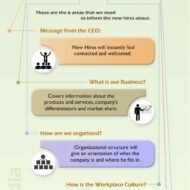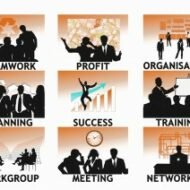Posted by Managementguru in Business Management, Human Resource, Principles of Management
on Mar 2nd, 2014 | 0 comments

Objectives and Functions of HRM Human Resource Management is very challenging because of the dynamic nature of the people and it is not only managing men but involves administering a social system. According to Dale Yoder “Man power management is the function or activity in directing working men and women in maximizing their satisfaction in employment.” George R. Terry says, “Personnel management is concerned with the obtaining and maintaining of a satisfactory and satisfied work force.” OBJECTIVES OF HUMAN RESOURCE MANAGEMENT: 1. Social Objectives: a) Facing the challenge of unemployment and providing people with maximum employment opportunities is the first and foremost priority of countries like India where there is pressure of population growth. b) The employees must be able to derive maximum satisfaction from the work performed. c) The system should facilitate harmony and co-operative endeavor for one and all. 2. Personal Objectives: Job satisfaction and rewards in the form of pay, promotion and recognition is aimed at, on the part of employees. This can be achieved by providing adequate remuneration, opportunities for advancement, facilities for training and development, job security and proper work. 3. Enterprise Objectives: This can be achieved by selecting the right people for the right job, empowering them through training, development and participation. FUNCTIONS OF HUMAN RESOURCE MANAGEMENT: 1. Planning: Assessment of future man power requirement is done with the help of man power inventory chart followed by the recruitment and selection process. A clean job description is needed to lure people with the right skills for the right position. It is the responsibility of the manager of a firm to lay down specifications of the qualities and skills required by the workers and determining sources from where the workers are to be recruited. Selection is done by means of written test and personal interviews. 2. Organizing: This involves proper designing of organizational structure, the inter relationship between jobs, establishing smooth channels of communication, assignment of authority, responsibility and creating accountability, establishing line and staff relationship etc. 3. Directing: Issuing orders and instructions down the line and motivating the work force to carry out those instructions satisfactorily. Positive motivation in the form of financial and non-financial incentives, a good working environment is essential on the part of the management. 4. Controlling: The motive is to ensure that performance of each worker coincides with the plans or standards. Bench marking, Total quality management and Six sigma are some of the popular concepts of standardization. → Scope and Characteristics of...

Posted by Managementguru in Business Management, Principles of Management
on Feb 15th, 2014 | 0 comments

Functions of Management MANAGEMENT FUNCTIONS The objective of this topic is to make students understand the functions of management and the role of managers in an organization. The five basic management functions are listed below: · PLANNING · ORGANISING · STAFFING · LEADING · CONTROLLING PLANNING: The managerial activities aid in selecting the objectives, examine and forecast changes, develop policies, procedures and choose future course of action from among alternatives. Planning proceeds from “Where we are” to “Where we want to go.” Planning activities are 1. Analysing the current situation (also called the SWOT Analysis) 2. Anticipating or predicting the future based on the analysis 3. Determination of organizational objectives to be achieved 4. Deciding on the action plan 5. Evolving proper strategies 6. Pooling the resources (physical, financial and monetary) to accomplish enterprise objective ORGANISING: It is a process which integrates people and tasks; In order to achieve their tasks people are given sufficient authority, tools and information. Organising activities include 1. Specification of job responsibilities 2. Grouping of jobs into respective work units 3. Allocation of resources STAFFING: Human resource management is one of the key areas that decides the success of a firm’s activity. Staffing involves the selection of “Right person for the right job.” The activities are 1. Recruitment 2. Selection 3. Training and Development 4. Compensation 5. Promotion 6. Evaluation and 7. Rewarding people to achieve enterprise goals. LEADING: Leadership is the set of interpersonal behaviors that influence people to contribute to the organization and group goals. The activities under this category are 1. Providing proper direction 2. Guidance and Motivation 3. Clarity in communication to the work force CONTROLLING: This is a process that is necessary to keep track of the performace of individuals by setting some standards for direction. The activities include 1. Establishing performance standards enabling the work force to achieve the goals (both short term and long term) 2. Enhancing the employee performance through performance appraisal or rating of work 3. Comparison of performance against the standards to identify deviation or work problems and take corrective measures 4. Bench marking is one of the management techniques that facilitates an organization to uplift its performance levels to the best of industry standards and also catch hold of the strengths of the competitors and rectify the weaknesses prevailing in one’s own firm. CO-ORDINATION: It is regarded as a key function of a manager to bring in harmony among individuals and an effort towards accomplishment of goals. 1. Marginal decision making and 2. Sub Optimisation are some of the new approaches developed in the field of decision making. MANAGERIAL SKILLS: Skill is the resultant effect of knowledge, experience and expertise. It is the ability of an individual to perform a task which is obvious from the results he/ she shows. There are 3 kinds of skills that a manager should possess in order to excel. 1. The Conceptual Skill: Assessing a situation and acting accordingly depicts the manager’s perceiving ability of the abstract elements in force. A manager has to improve this kind of skill as he moves up the ladder in the management level or let us say that he can move up the ladder only if he possesses this kind of skill. · Management Consultants · Managing Director of a firm · President of a company · Economists · Startegists are conceptual analytic experts 2. The Technical Skill: This skill is purely based on one’s knowledge and on the job experience. This is needed at a lower level of management · Computer Operators · Engineers · Accountants · Machine Operators possess this kind of skill 3. The Human Relations Skill: This...




